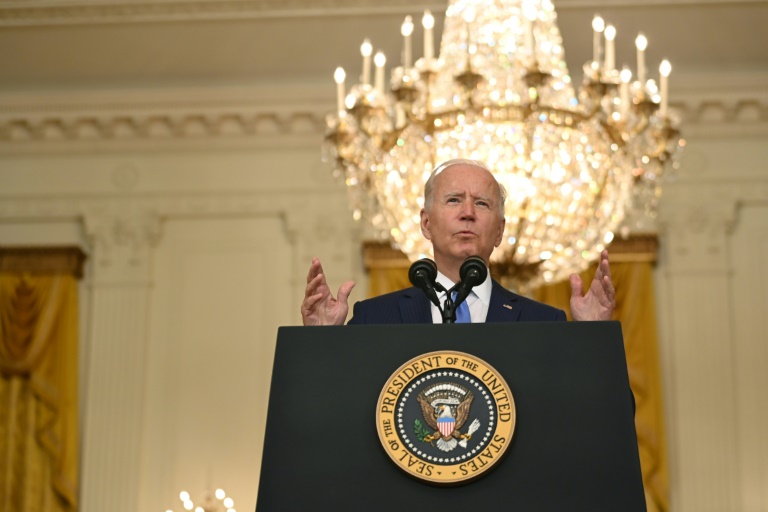President Joe Biden said Thursday he is confident Congress will pass a mammoth middle class spending plan that can “change the trajectory” of the United States.
In a speech at the White House, Biden said rebuilding the US economy in the wake of Covid-19 shutdowns is “an opportunity to be the nation we know we can be.”
Making the case for some $3.5 trillion in spending on social services, like education, child care and climate crisis issues, Biden said “we’re at an inflection point in this country — one of those moments where the decisions we make can change the trajectory of our country for years or decades to come.”
Biden also argued for a series of tax increases aimed at corporations and the very wealthy, saying that loopholes allow America’s richest entities and individuals to end up paying almost no income tax.
“It’s long overdue. I’m not out to punish anyone. I’m a capitalist… All I’m asking is you pay your fair share,” he said. “It’s about the super wealthy finally beginning to pay what they owe.”
The Democrat is banking on this message of fairness to get him across the finish line in Congress, where his party holds a razor thin majority over a Republican opposition showing no desire to compromise.
The $3.5 trillion social spending package would come on top of an approximately $1 trillion infrastructure plan for things like roads and bridges.
Republicans have agreed to support that smaller bill — an extremely rare case of bipartisanship that Biden also hopes to use as proof of his claims to have tried to unite the country.
Hammered at home and abroad over the messy withdrawal from Afghanistan, where he ended America’s lost 20-year war against the Taliban, Biden is keen to pivot to domestic issues and secure Democrats a major victory ahead of next year’s congressional elections.
A big domestic win would also help resuscitate his presidency, which after a strong start looks bogged down by the Afghanistan fallout, a complicated economic recovery after Covid shutdowns, and a resurgence of the pandemic thanks to the Delta variant of the coronavirus.
With an average approval rating of 46 percent, according to FiveThirtyEight, Biden is one of the most unpopular presidents at this point in the first term in modern history — even if he is way ahead of where Donald Trump was at the same mark with 38.8 percent approval.
– Hard bargaining –
Biden says his “Build Back Better” plan will tilt the economy in favor of ordinary Americans after years of growing wealth gaps and a fraying of basic social services like education.
It’s a message with broad appeal, but Democrats are squabbling over how far to push it, with many content with the $3.5 trillion price tag, leftist leaders wanting even more, and some moderates insisting on less than half.
With Democrats unable to afford losing a single vote in the 50-50 Senate and little more than that in the almost equally tight House of Representatives, Biden’s entire agenda hangs in the balance.
The key Senate votes are Democratic moderates Joe Manchin and Kyrsten Sinema, who have cold feet about the higher price.
Under pressure from his party to become more personally involved, Biden met privately with both Sinema and Manchin at the White House on Wednesday.
The administration on Thursday also touted a letter of support signed by 15 Nobel economics prize winners who say his social spending plan will promote “success in the 21st century.”
However, Republicans are playing hardball.
They not only refuse to countenance the multi-trillion-dollar package but sense a chance to deal the Biden presidency a severe blow ahead of next year’s polls, when they hope to take control of Congress.
In addition to trying to block the big spending package — while agreeing to the smaller, hugely popular infrastructure bill — Republicans are threatening to cause havoc by blocking approval of an increase to the national debt.
For years this has been largely a technicality and Republicans agreed to relax borrowing restrictions repeatedly when Trump was president.
Refusing to vote for it in the coming weeks will force the Democrats to scramble to find ways to avoid a funding crisis that could trigger a US default and plunge the economy into turmoil.









